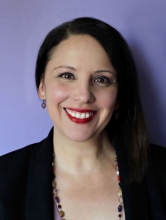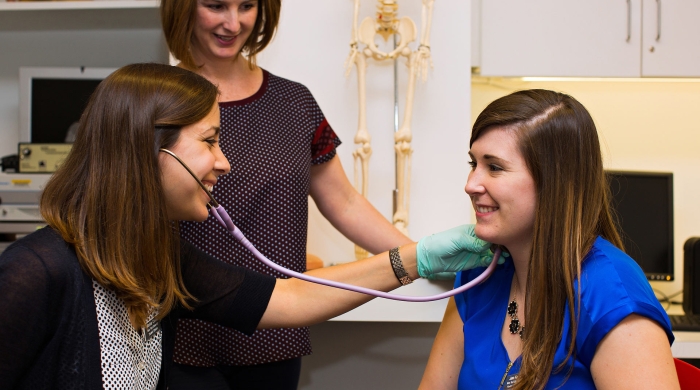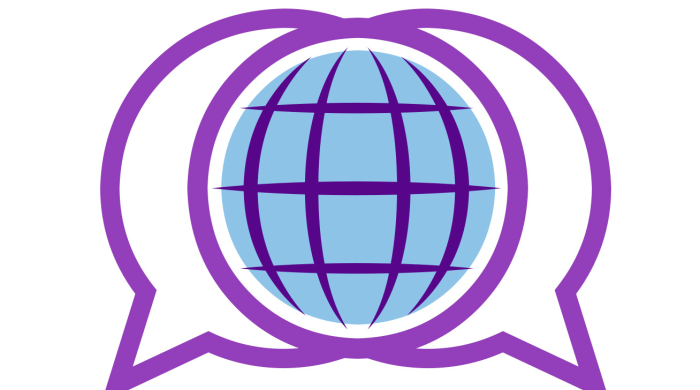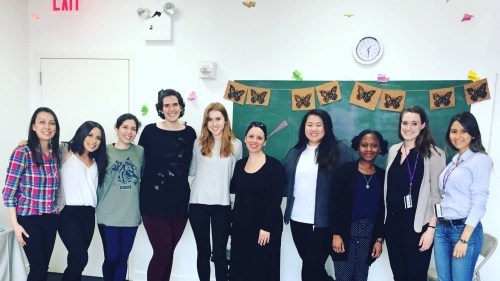
Dr. Brea, center, posing with members of NYU's BLLING chapter during their time as students.
“I was born and raised in the Dominican Republic, speaking, reading, thinking, dreaming, and feeling in español,” says Clinical Associate Professor of Communicative Sciences and Disorders and Director of the Bilingual Extension Program María Rosa Brea.
The first person in her family to pursue an advanced degree in the United States, Dr. Brea found that her experience studying speech-language pathology in largely white and English-centric academic and professional settings left her searching for a feeling of belonging. In 2012, while teaching at the University of South Florida, Dr. Brea and a colleague sought to create a new community of their own dedicated to culturally and linguistically responsive speech-language pathology practices and formed BLLING – the Bilingual Language and Literacy Investigative and Networking Group.
Since then, BLLING has traveled with Dr. Brea to NYU Steinhardt and continued to expand. Today, four universities have active BLLING chapters, and students and professionals from across the country participate in the organization’s monthly programming. We connected with Dr. Brea to learn more about BLLING’s origin story and her future goals for the learning community.
What inspired you to found BLLING?
It’s difficult to discuss the origin of BLLING without highlighting my positionality. I am an immigrant from the Dominican Republic who moved to the US the summer before my senior year of high school. So, for this story, my ethnicity, my Latinidad, and my linguistic heritage are most relevant. Becoming an educated Latin American woman in the United States meant I had to learn to be “the first” and sometimes “the only” minoritized person in various settings.
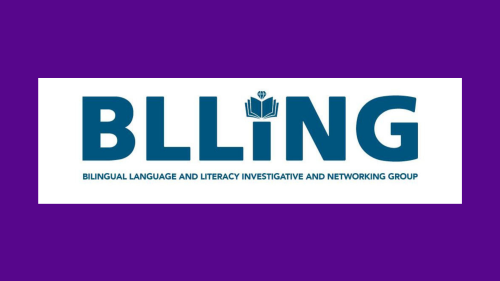
The latter most often translated to feeling that I did not belong; I did not have community with like-minded peers. This was the prevalent narrative until my friend and colleague and I sought to create the counter-narrative in 2012: we imagined and co-developed a community of students and colleagues who would be focused on learning and teaching about emerging multilingualism, literacy, and linguistic justice.
What does being involved in BLLING entail?
BLLING’s focus is three-pronged: research, teaching, and service. Part of what we do is collaborate with researchers and practitioners in speech-language-hearing and related fields to provide educational opportunities for students in the form of podcast interviews, guest talks, and panels.
Additionally, members are able to join hands with educational centers that serve minoritized families and children to provide staff workshops or family-centered trainings. These interactions often explore that all heritage languages and their varieties are highlighted and valued in learning settings.
BLLING members also work together to collect resources that speech-language therapists may need. For example, BLLING-NYU worked together on resources for families that used multi-modal (augmentative and alternative communication) and multilingual communicative approaches.
What has the impact of BLLING been so far?
I never thought this personal need I had to have a community was shared by others. In hindsight it all makes sense – we all have a core need to belong.
Beyond creating this space for others, BLLING has a “mirrors and windows” effect – when minoritized students see themselves in the speakers, topics, and causes we discuss, they can self-identify as deserving a space as change-makers in academic and clinical settings. This is powerful; it invites minoritized students to dream up futures they have not yet imagined. The speech-language-hearing profession needs a different future that more accurately represents the multiply-braided identities of the people we serve.
There are also the ripples of community service turned activism: once students come in contact with local communities and understand systemic issues that exist, their own critical consciousness is raised and they organize to make change.
“I feel more confident as a LatinX woman in a profession where I felt my voice was one of the few. BLLING gave me the space to grow clinically and personally in ways I could not find elsewhere.”
What are your goals for the future of the organization?
Well, sustainability, first. Membership is free and all members participate on a voluntary basis. Conservatively, what I see as an achievable next step is work we already started this past year – creating a systematic structure that provides a regular flow of information from the community to our professional spheres through blog posts, podcast interviews, guest speakers, and more.
Now that cities are opening up, another goal is being more intentional about reconnecting and reaping the gains from remote learning to create hybrid opportunities for community engagement.
Bigger dreams include:
- Devising a series of training videos (led by students, teachers, and caregivers) to create a flexible curriculum focused on culturally and linguistically responsive and liberatory practices and;
- Working with BLLING’s minoritized faculty and practitioners who are engaged with the organization as advisors to create spaces for imagination and collaboration. I’m envisioning group writing and idea-generating sessions in which we pitch proposed talks, community events, or process major theoretical frameworks we wish to use as guides in the work we will be doing together.
How can readers interested in BLLING join the community?
BLLING will be hosting some in-person events this summer, so anyone interested can feel free to e-mail us at blling.slp@gmail.com, complete the contact form through our website, or connect us on Instagram and Facebook. Additionally, we are part of NYU Engage, the online community where students of all levels of study can join clubs.
Related Programs
Communicative Sciences and Disorders
The Communicative Sciences and Disorders Program offers rigorous training for students seeking high-quality education in speech-language pathology.
Bilingual Extension (BE) Track
Through our Bilingual Extension Program (BEP), students have the opportunity to supplement their master’s with training on evaluating and treating clients using culturally and linguistically appropriate theory and methods.

